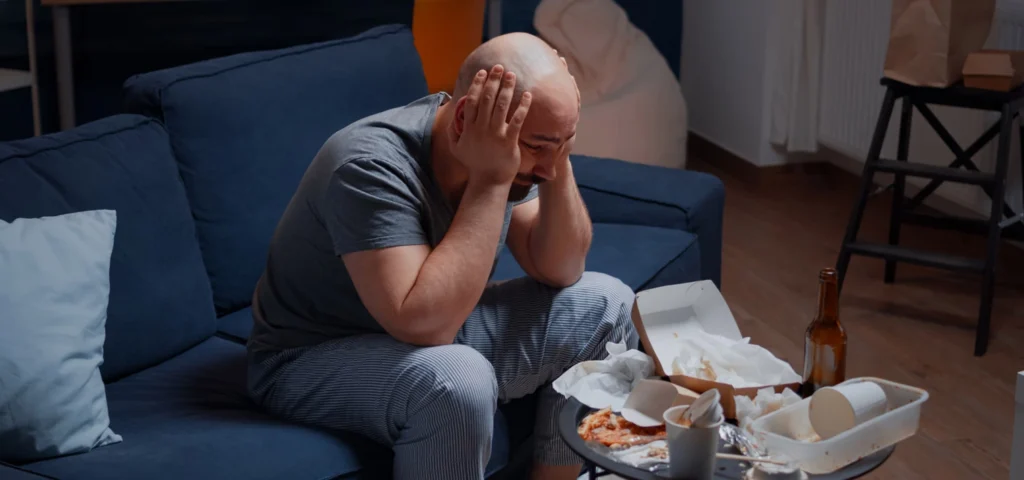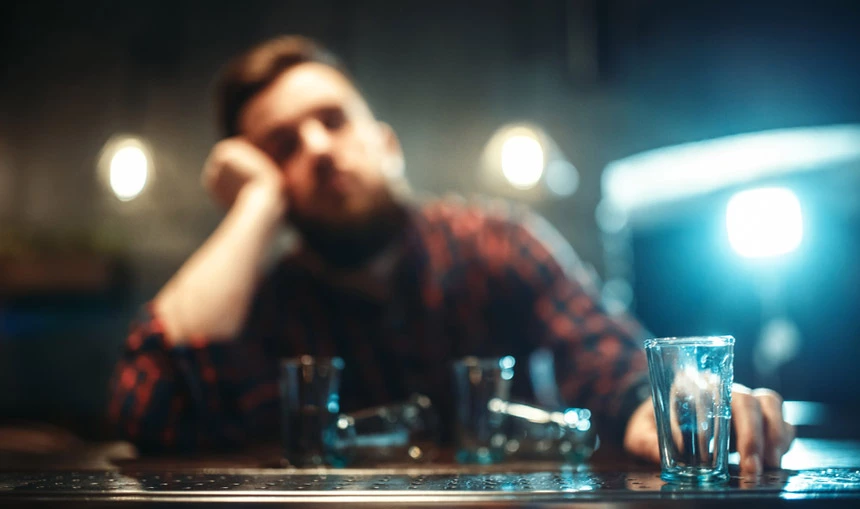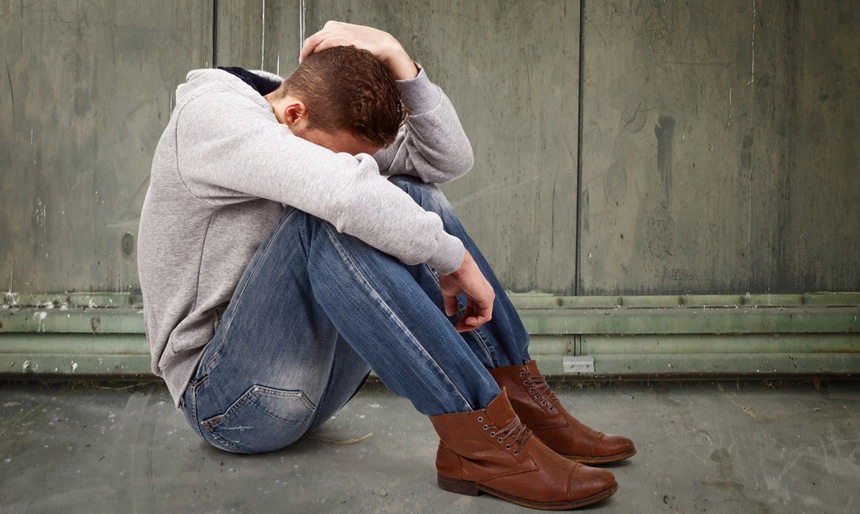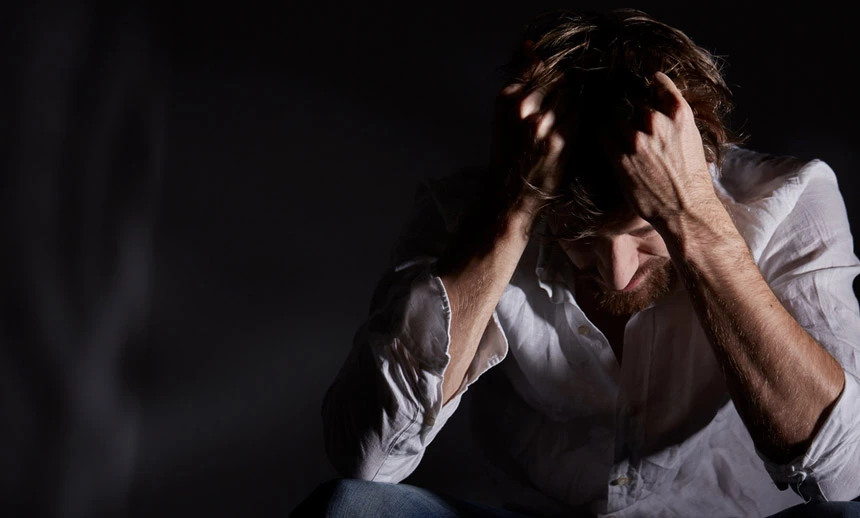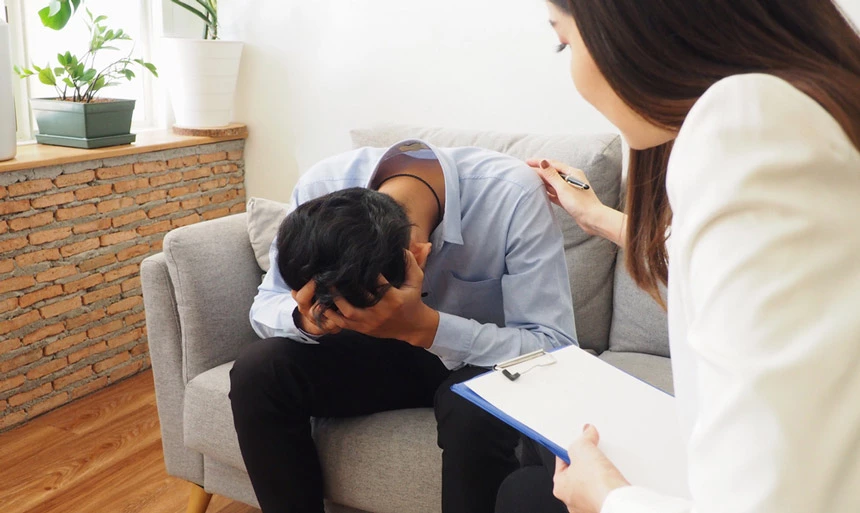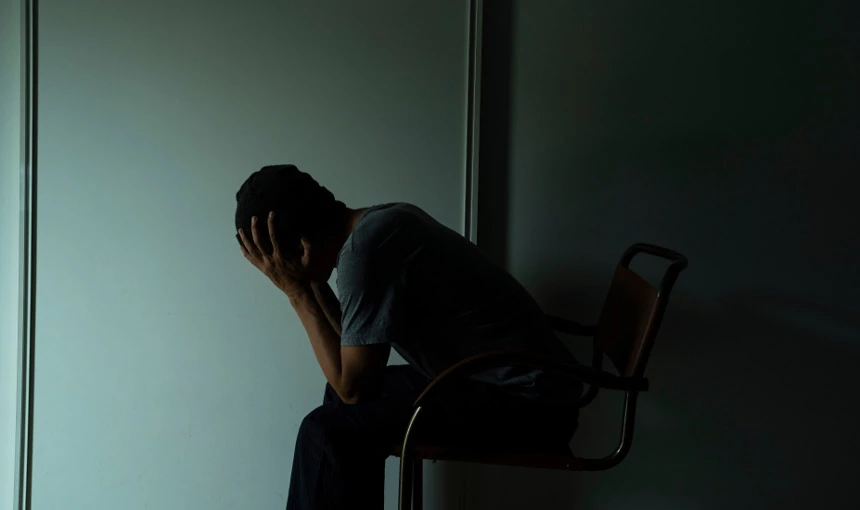The Link Between Bipolar Disorder and Alcohol Abuse
Table of Contents
- The Link Between Bipolar Disorder and Alcohol Abuse
- Connections Between Bipolar and Alcohol Abuse
- Traits of Alcohol Dependence and Bipolar Disorder
- What are the Different Types of Bipolar Disorder?
- What are the Signs of Alcohol Use Disorder?
- Signs that You Have Comorbid Bipolar Disorder and Alcohol Use Disorder
- Similarities Between Bipolar Symptoms and Drinking Behavior
- Hypomania and Alcohol Abuse Behaviors
- Depressive Alcohol Abuse Behaviors
- The Importance of Seeking Professional Treatment
- How to Treat Co-Occurring Alcoholism and Bipolar Disorder
- Maintaining Long-Term Recovery
- Get Help for Alcohol and Bipolar Disorder Today
- Frequently Asked Questions on Alcohol and Bipolar Disorders
- Medically Reviewed By
If you have been diagnosed with bipolar disorder, you may not realize that you are at higher risk of abusing alcohol. If you are already dependent on alcohol for managing your bipolar symptoms, there are treatment options that can help you overcome alcohol abuse.
Let’s take a closer look at alcohol and bipolar disorder, its various forms, and treatment options available with the help of Find Addiction Rehabs for those who are struggling.
Connections Between Bipolar and Alcohol Abuse
According to the National Institute on Alcohol Abuse and Alcoholism, some researchers believe that alcohol abuse can actually trigger bipolar symptoms. However, there is no hard evidence that supports this. Some experts theorize that people with bipolar disorder actually use alcohol to subdue their bipolar symptoms, such as when they are experiencing manic signs.
Another potential theory for the link between alcohol and bipolar disorder is that people with bipolar disorder tend to act recklessly, which could also be a sign of alcohol abuse. Research also shows that people who are diagnosed with alcohol use disorder but later exhibit bipolar symptoms may be able to receive treatment and recover more quickly.
However, if you are initially diagnosed with bipolar disorder, and later abuse alcohol, you might have more difficulty overcoming alcohol abuse. With that said, there is always hope regardless of which diagnosis came first.
Traits of Alcohol Dependence and Bipolar Disorder
Interestingly enough, unhealthy relationships with alcohol and bipolar occurring in tandem is not rare and can actually be a trait of the mental health condition. Abusing alcohol or drugs including binge drinking is very common among people suffering manic episodes.
In fact, the Substance Abuse and Mental Health Services Administration reports that approximately 40 percent of people with bipolar disorder have abused drugs or alcohol at some point in their lifetime.
While alcohol and pain pills act like a depressant and reduce the symptoms of mania, stimulants such as cocaine have boosted people’s feelings of depression. Along with binge drinking, bipolar alcoholic traits involve the following:
- Impaired judgment and impulsive actions
- Sleeping very little
- Unrealistic beliefs about one’s abilities
- Acting recklessly without considering the potential danger
What are the Different Types of Bipolar Disorder?
People with bipolar disorders often experience different symptoms and struggles depending ont the type and severity of their mental health disorder. Knowing which type you present as can help you better understand your side effects, and how these can lead to excessive alcohol consumption.
According to the American Psychiatric Association (APA), there are three main types of bipolar disorder:
- Bipolar I disorder is the most severe type. It involves at least one manic episode, which is a period of abnormally elevated or irritable mood that lasts at least one week. Manic episodes can also be accompanied by symptoms such as racing thoughts, decreased need for sleep, increased energy, and reckless behavior.
- Bipolar II disorder is characterized by depressive episodes and hypomanic episodes. Hypomanic episodes are less severe than manic episodes, but they can still interfere with your daily life. Symptoms of hypomania can include increased energy, racing thoughts, decreased need for sleep, and increased activity levels.
- Cyclothymic disorder is a milder form of bipolar disorder. It involves repeated periods of hypomania and depression that last for at least two years. The symptoms of cyclothymic disorder are not as severe as those of bipolar I or II disorder, but they can still cause significant distress and impairment.
Some individuals also experience a condition known as rapid cycling bipolar disorder is a type of bipolar disorder in which people experience four or more mood episodes (manic, hypomanic, or depressive) within a 12-month period.
What are the Signs of Alcohol Use Disorder?
If you are struggling with a mental illness, your chances of alcohol and substance abuse can be significantly higher. This is why it is so important to know how to recognize the signs of alcohol use disorders, so that you can recognize when it is time to get help.
According to the Diagnostic and Statistical Manual (DSM-5), the most common signs associated with this substance use disorder include:
- Drinking more than you intended.
- Trying to cut down or quit drinking, but not being able to.
- Spending a lot of time drinking, getting alcohol, or recovering from alcohol use.
- Craving alcohol, even when you know it’s not good for you.
- Needing more alcohol to get the same effect.
- Withdrawal symptoms when you don’t drink.
- Giving up important activities or relationships because of alcohol.
- Continued drinking despite having problems caused by alcohol.
If you or someone you know is experiencing any of these signs, it’s important to seek help. Alcohol addiction is a serious disease on its own, and even more so when accompanied by major mental disorders, but it can be treated. There are many effective treatment options available, and with help, you can recover and live a healthy, sober life.
Signs that You Have Comorbid Bipolar Disorder and Alcohol Use Disorder
Many people who struggle with addiction have comorbid psychiatric disorders, including bipolar affective disorder. It is important to know how to recognize whether you are struggling with underlying substance use disorders that may be contributing to your alcohol and drug abuse.
Because the side effects of alcohol abuse and withdrawal can mimic the mood symptoms of many mental health disorders, it can be difficult to diagnose bipolar disorder alongside an active alcohol addiction.
With that being said, it is possible to diagnose a co-occurring bipolar illness alongside alcohol misuse. If your manic symptoms and/or depressive moods were present before you started chronically drinking alcohol, or continue to occur during long periods of abstinence, then it is likely that you have both bipolar disorder and an addiction.
Similarities Between Bipolar Symptoms and Drinking Behavior
As mentioned, people with bipolar disorder tend to have drinking behavior that fluctuates with their mood. The most complex part of having both diagnoses is that drinking behaviors can often be similar to the episodes of bipolar disorder, one of the many similarities alcohol and bipolar disorder share in terms of effect.
Both alcoholism and bipolar disorder lead to a physical and emotional risk for any individual. Alcohol abuse as well as bipolar symptoms lead to relationship issues, financial instability, accidental injuries, and other risk factors.
For example, according to a 2002 paper from the National Institute on Alcohol Abuse and Alcoholism, alcohol can actually enhance the symptoms of depression as well as mania. Alcohol affects the same brain chemicals in the central nervous system and, thereby, can trigger symptoms of manic depression.
There are people without bipolar disorder who actually become more depressed from drinking too much alcohol. Those with alcohol and bipolar disorder issues simultaneously have all the more reason to be concerned.
Alcohol also reduces people’s inhibitions and can make them act in irresponsible ways. This is similar to the way bipolar disorder causes reckless behaviors. This shows that combining alcohol abuse and bipolar disorder can be very dangerous for any individual.
According to Daniel K. Hall-Flavin, M.D., a board certified in general psychiatry and addiction psychiatry, bipolar disorder and alcoholism can be a dangerous combination.
Each substance abuse disorder can worsen the severity of the other, as alcohol and bipolar disorder have been linked throughout studies referenced above. As such, having both conditions increases the risk of mood swings, depression, violence, and even suicide.
If you’re experiencing suicidal ideation in any form, please contact a crisis hotline to seek their counsel about appropriate steps to take for your safety.
Hypomania and Alcohol Abuse Behaviors
A common behavior of bipolar disorder is exhibiting hypomania, which is similar to mania, but involves an episode of hyperactivity that generally lasts for a period of at least four days. It has a range of different symptoms as follows:
- Extreme happiness
- Increased self-esteem
- Excessive energy
- Needing little sleep
- Increased activity and creativity
- Greater irritability
- Increased agitation
- Easily distracted
Sometimes a person who is in the midst of an episode of hypomania may start misusing alcohol in order to diminish this high mood and reduce negative symptoms. Both alcohol and illegal drugs have been used by people with bipolar disorder to manage early symptoms of hypomania, mania, and depression.
Researchers have found that hypomania symptoms are often associated with drug abuse. In fact, on average, people with bipolar disorder have their first alcoholic drink more than two years earlier than individuals without this medical condition.
Essentially, there is a change in drinking among people who experience hypomania. It often depends on the mood of a person; his or her drinking habits tend to change with their manic and depressive stages.
Depressive Alcohol Abuse Behaviors
Just as mania can cause a bipolar patient to recklessly drink alcohol, so too can a depressive episode. This is why this psychiatric disorder puts bipolar patients at a particular risk for addiction, as their affective symptoms can easily trigger alcohol and other drug abuse.
Those experiencing severe depression may use their drinking as a way to manage their symptoms. Over time, their alcohol use can become a crutch due to the temporary relief it can provide. Unfortunately, this usually only makes their affective disorders worse, leading to addiction bipolar comorbidity.
Unipolar depression and comorbid substance use can have serious health effects, which is why it is crucial to seek treatment with addiction and mental health professionals who can address both your mood disorder and substance abuse.
The Importance of Seeking Professional Treatment
Because of the complex nature of mood disorders and the alcohol withdrawal process, it is crucial to seek out the help of an addiction or mental health professional when trying to overcome your co-occurring disorders.
Comorbid patients are at a particularly high risk of experiencing severe withdrawal effects and rebound symptoms of their mental illness when recovering from substance abuse. Fortunately, there are many researched and comprehensive treatment strategies available to help navigate you through the recovery process.
How to Treat Co-Occurring Alcoholism and Bipolar Disorder
Co-occurring alcoholism and bipolar disorder is a serious mental health condition that requires comprehensive treatment. The goal of treatment is to help the individual achieve and maintain sobriety, stabilize their mood, and improve their overall quality of life.
There is no one-size-fits-all treatment approach for co-occurring alcoholism and bipolar disorder. The best treatment plan will vary depending on the individual’s specific needs and circumstances. However, some common treatment approaches include:
Medical Detox to Manage Withdrawal
During the initial treatment process, your first step in recovery will likely be a medical detox program. This will allow you to recover under the careful supervision of a medical professional, who can help manage symptoms of withdrawal and alcohol cravings, as well as ease your bipolar symptoms.
This is especially important if you are suffering from severe bipolar disorder or addiction, as this is a risk factor for experiencing more severe and potentially life-threatening withdrawal effects. During this period, you will receive medications, dietary counseling, and emotional support to make the early stages of recovery more comfortable.
Therapy for Bipolar Disorder Symptoms
One of the main components of your recovery process will be participating in various holistic and evidence-based therapies. This can help you better understand your mood disorder and the other contributing factors of your addiction, and develop the necessary coping skills to maintain a happier, healthier life.
Psychotherapy can help the individual to understand their condition, develop coping skills, and make lifestyle changes that support sobriety. Some common types of psychotherapy for co-occurring alcoholism and bipolar disorder include cognitive-behavioral therapy techniques (CBT), dialectical behavior therapy (DBT), and motivational interviewing.
You may also participate in mindfulness and holistic healing activities, such as yoga, meditation, journaling, and other practices. Individual, group, and family therapy are all also integral components to the process of recovery from co-occurring disorders.
Medication Management
Medications can be an effective way to treat both alcoholism and bipolar disorder. Mood stabilizers, such as lithium and valproate, can help to ease your mood swings and reduce the risk of relapse. Antidepressants can also be helpful in treating the depressive symptoms of bipolar disorder.
Certain medications can also be used to manage alcohol withdrawal and cravings to make the recovery process more comfortable. Depending on the specific mood stabilizer or other medication you are taking, it is important to make sure that you are using this medication only as prescribed.
Recovery Support Groups
Support groups can provide you with a safe and supportive environment to share your experiences, connect with others who understand what you are going through, and learn from others’ experiences.
There are many different types of support groups available for people with co-occurring alcoholism and bipolar disorder, including 12-step programs, peer-led support groups, and family support groups. You can speak with your treatment provider to discuss which of these groups will be a good fit for you.
Maintaining Long-Term Recovery
In addition to these treatment approaches, you may also need to make lifestyle changes to support your recovery. These changes may include getting regular exercise, eating a healthy diet, getting enough sleep, and avoiding triggers that may lead to drinking or mood swings.
Treatment for co-occurring alcoholism and bipolar disorder can be challenging, but it is possible to achieve recovery. With the right treatment plan and support, you can learn to manage their condition and live a healthy and fulfilling life.
Get Help for Alcohol and Bipolar Disorder Today
If you are looking to find peace and live a life free from alcohol as well as the mood swings of bipolar disorder, there are many professionals out there who have experience with helping people in your situation overcome this difficulty.
If you or someone you know needs help with alcohol and bipolar disorder, or any related addictions or behavioral disorders, the recovery representatives available around the clock at Find Addiction Rehabs are here to help.
Call anytime 7 days a week 24 hours a day. The team at Find Addiction Rehabs has helped countless others and can help you find the experts and resources you need for long term recovery.
Frequently Asked Questions on Alcohol and Bipolar Disorders
Can Bipolar Disorder Cause Addiction?
Yes, bipolar disorder can increase your risk of developing a substance use disorder. People with this mood disorder are more likely to abuse drugs and alcohol than people without the condition.
Bipolar women are considered to be at an increased risk of this, but this comorbidity can affect anyone with this mental illness. Being aware of your risk for addiction and other behavioral issues due to bipolar disorder is important in order to get the help you need before the situation worsens.
Does Alcohol Interfere With Bipolar Medication?
Yes, alcohol can interfere with bipolar medication. Alcohol is a depressant, which means it slows down the central nervous system. Bipolar medications also work on the central nervous system, so when alcohol is added, it can have a negative impact on how the medication works. It is important to never drink while on medication without first speaking to your doctor about how this combination can affect you.
Deborah Tayloe is a freelance writer specializing in health and sciences. Deborah earned a B.S.Ed. in Secondary Education/English, accompanied by a Spanish minor. Her writing expertise allows her to craft engaging, impactful articles to help people be well.
In addition, she holds a fully accredited Certificate of Natural Medicine and is a certified Herbalist. Through her understanding of complementary medicine, Deborah helps medical professionals give people the information they need to embrace natural approaches to wellness.
When she’s not working, Deborah trains for 5K races and advocates for animal rights.
